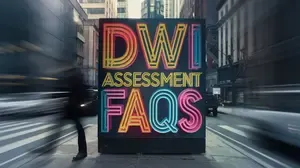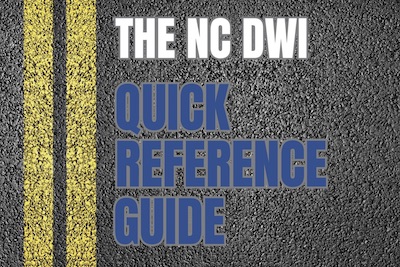DWI Assessments in North Carolina: Frequently Asked Questions
 If you're facing a DWI charge in North Carolina, you likely have questions about the assessment process and its impact on your case. This FAQs page aims to provide clear, straightforward answers to some of the most common questions we receive about DWI assessments.
If you're facing a DWI charge in North Carolina, you likely have questions about the assessment process and its impact on your case. This FAQs page aims to provide clear, straightforward answers to some of the most common questions we receive about DWI assessments.
At Powers Law Firm, we understand that navigating a DWI case can be challenging. We serve clients throughout the Charlotte metro region, including Mecklenburg, Iredell, Gaston, Union, Rowan, and Lincoln counties. If you need personalized advice about your situation, don't hesitate to reach out. You can text or call us at 704-342-4357 to speak with Senior Attorney Bill Powers.
Let's dive into some of the key questions about DWI assessments in North Carolina.
A DWI assessment in North Carolina is a comprehensive evaluation conducted by a qualified substance abuse professional. Its purpose is to determine whether someone has a substance use disorder and, if so, to what extent. The assessment involves a detailed interview, standardized testing, and a review of the history with alcohol and drugs.
NC DWI assessments are performed by certified substance abuse counselor and comply with North Carolina DMV requirements. The legal limit in North Carolina is .08. The entire assessment process normally takes about an hour and involves an in depth clinical interview.
To be clear, an alcohol assessment that is part of North Carolina's DWI requirements for license reinstatement does not assume a substance abuse disorder or problem with alcohol or drugs. Indeed, a DWI substance use assessment can serve as a mitigating factor and will be balanced against any aggravating factors by the Court (the Judge).
The importance of a DWI assessment cannot be overstated. First and foremost, it's a statutory mitigating factor in North Carolina, which means it can potentially lead to a more favorable outcome if you are convicted. Additionally, completing an assessment is necessary if you wish to obtain a pretrial limited driving privilege, allowing you to drive under certain conditions while your case is pending.
A DUI assessment consists of a screening tool, and meeting with a professional to determine education, treatment, and/or intervention programs might be helpful. DWI s serves another valuable purpose. It provides an opportunity for self-reflection, allowing you to take an honest look at your relationship with alcohol or drugs. This introspection can be an important first step in making positive changes, regardless of the legal outcome of your case.
 The DWI assessment process in North Carolina follows a standardized procedure to ensure consistency across the state. Here's what you can expect:
The DWI assessment process in North Carolina follows a standardized procedure to ensure consistency across the state. Here's what you can expect:
- Initial Interview: The process begins with a comprehensive interview conducted by a licensed or certified substance abuse professional. They'll ask about your history of alcohol and drug use, including frequency and quantity, any previous substance-related incidents, and the circumstances of your current DWI charge.
- Standardized Testing: You'll likely be asked to complete one or more standardized tests. These are scientifically validated tools designed to measure various aspects of substance use and its effects on your life.
- Document Review: The evaluator will review relevant documents, such as the police report from your DWI arrest and the results of any chemical tests performed.
- Assessment Compilation: Based on the interview, testing, and document review, the evaluator will compile their assessment. This will include their professional opinion on whether you have a substance use disorder and recommendations for education or treatment if necessary.
- Recommendation: Depending on the assessment results, you may be recommended for an education program like ADETS (Alcohol Drug Education Traffic School) or a more intensive treatment program.
The entire process usually takes between one to two hours. It's designed to be thorough yet efficient, recognizing the importance of timely information in DWI cases.
 This is a common concern, and it's important to understand that your privacy is protected during the DWI assessment process. The information gathered during your assessment is considered confidential and is protected under federal laws, including HIPAA (Health Insurance Portability and Accountability Act).
This is a common concern, and it's important to understand that your privacy is protected during the DWI assessment process. The information gathered during your assessment is considered confidential and is protected under federal laws, including HIPAA (Health Insurance Portability and Accountability Act).
Here's what you need to know:
- Confidentiality: The details of your assessment are kept confidential. They are not automatically shared with the court or prosecutor.
- Controlled Disclosure: The results will only be shared with the court or other parties with your explicit consent or as required by law.
- Strategic Use: In some cases, sharing the results of your assessment with the court can be beneficial to your case. For example, if the assessment shows no significant substance use issues, this could potentially lead to a more favorable outcome.
- Legal Guidance: Your DWI lawyer can advise you on whether and when it might be beneficial to share the results of your assessment as part of your defense strategy.
Remember, the purpose of the assessment is not to determine guilt or innocence in your DWI case. Instead, it's designed to identify any potential substance use issues and recommend appropriate interventions if necessary. The confidentiality of the process allows you to participate openly and honestly without fear of self-incrimination.
A DWI assessment plays a critical role in the license reinstatement process in North Carolina. Here's how it factors in:
- Mandatory Requirement: The North Carolina Department of Motor Vehicles (DMV) requires individuals seeking to reinstate their license after a DWI conviction to complete both an assessment and any recommended education or treatment program.
- Determining Intervention Level: The assessment helps determine what level of intervention is needed before the DMV will consider reinstating your driving privileges. This could range from a short-term education program to more intensive treatment.
- Completion Certificate: Once you've completed the assessment and any recommended program, you'll receive a certificate of completion. This certificate is one of the documents you'll need to present to the DMV when applying to have your driving privileges restored.
- Separate from Court Proceedings: It's important to note that the license reinstatement process is separate from your court proceedings. Even if you've completed all court-ordered penalties, you'll still need to satisfy the DMV's requirements, including the assessment and any recommended follow-up, to regain your driving privileges.
- Tailored Recommendations: The assessment's recommendations for education or treatment are tailored to your individual needs. Following through with these recommendations not only helps with license reinstatement but also provides valuable insights and strategies for preventing future impaired driving incidents.
Remember, completing a DWI assessment and following through with its recommendations is not just about regaining your license. It's an opportunity to gain valuable insights into your relationship with alcohol or drugs and to develop strategies for safer future choices.
If you're navigating the complexities of a DWI case and have questions about assessments or any other aspect of your case, don't hesitate to seek professional legal guidance. At Powers Law Firm, we're here to help you understand your options and make informed decisions. You can reach us at 704-342-4357 to discuss your specific situation.
Remember, while a DWI charge presents challenges, it's not an insurmountable obstacle. With the right information and support, you can navigate this process and work towards a positive resolution.
 Navigating a DWI case in North Carolina can feel overwhelming, but knowledge is power. We hope these frequently asked questions about DWI assessments have provided you with valuable insights into what to expect and how the process works.
Navigating a DWI case in North Carolina can feel overwhelming, but knowledge is power. We hope these frequently asked questions about DWI assessments have provided you with valuable insights into what to expect and how the process works.
Remember, a DWI assessment isn't just a legal requirement—it's an opportunity. It's a chance to gain a clearer understanding of your relationship with alcohol or drugs, and potentially access support that can lead to positive life changes. Whether the outcome is a recommendation for education or more intensive treatment, the ultimate goal is to promote safer driving behaviors and overall well-being.
Every DWI case is unique, and the path forward after a DWI assessment can vary based on individual circumstances. That's why it's beneficial to have knowledgeable guidance as you navigate this process. At Powers Law Firm, we're committed to helping our clients understand their options and make informed decisions.
If you're facing a DWI charge in the Charlotte metro region, including Mecklenburg, Iredell, Gaston, Union, Rowan, or Lincoln counties, and have questions about DWI assessments or any other aspect of your case, we're here to help. You can reach out to Powers Law Firm by texting or calling 704-342-4357 to speak with Senior Attorney Bill Powers.
Taking this step can help you gain clarity on your situation and understand the best way to move forward. While a DWI charge presents challenges, it's not an insurmountable obstacle. With the right information and support, you can navigate this process and work towards a positive resolution. Your journey through the DWI process, including the DWI assessment, is an opportunity to learn, grow, and make informed decisions for your future.
 Powers Law Firm PA Home
Powers Law Firm PA Home



















